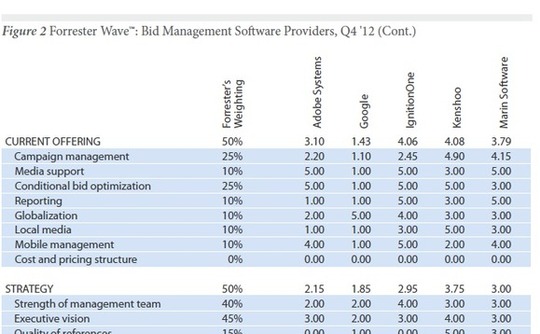Marin Software registered for an initial public offering last week. Venture capitalists love the ad-tech sector, but Marin is one of the first filing for initial public offering.
Marin offers workflow, tools, analytics, and optimization in what it calls its “revenue acquisition management platform,” more commonly known as bid management software. An IPO windfall could give it the resources to expand into a full-service digital campaign management platform.
While the company still is not profitable, that’s because of intense spending on expansion, rather than a lack of revenue. It lost $17.4 million during 2011 and $19.2 million during the nine months ending September 30, 2012. On the other hand, actual revenue grew 1,274 percent between 2009 and 2012.
“When you’re growing, you have to lose money. A few years down the road, [investors] want to see profit but that’s not the expectation now,” says Tom Taulli, author of “High-Profit IPO Strategies.”
Marin’s growth has been steady and fast. It rolled out the first iteration of its platform, Marin Search Marketer, in January 2008, and by the beginning of Q4, its customers were managing more than $200 million in annual paid search spending. By April 2010, it was managing $1 billion. To date, the company’s clients manage more than $4 billion in annual marketing spend, with customers including PriceGrabber, Symantec, and Salesforce.com.
It expanded operations to the U.K. in 2009, and opened corporate offices in Shanghai and Singapore in January 2011, also partnering with Baidu, the Chinese-language search engine to deliver integrated reporting, management, and optimization of Baidu campaigns on its platform.
In February 2012, Marin raised $30 million in a fifth round led by Temasek and SAP Ventures. That’s one possible trigger for the IPO filing, according to Taulli – aside from the market being hot.
“There comes a point, after six or seven rounds, you have to go somewhere. They’re at that point, and they have enough revenue that they will be credible as a public company,” Taulli says. “Also, this is a cloud-based company, and cloud has been red-hot for IPOs.”
There are two big risk factors for Marin’s expansion, according to its S-1: an inability to further penetrate mobile and display ad management, and competition from agencies’ in-house platforms, as well as third parties.
The majority of Marin’s revenues still come from search management, according to the filing. Marin has made headway into social media, and it was early to that party. It began managing Facebook ads in April 2010, and it added YouTube support in August of 2011. It also identified the rising importance of tablets in search and e-commerce that year.
Now, it needs to expand the use of its platform for mobile, social, and display advertising.
Marin is looking for future growth through partnerships with ad agencies. To date, its announced agency roster includes Razorfish and Neo@Ogilvy. In January 2011, it announced that Draftfcb would use its search platform; however, it’s not mentioning that agency any more.
Taulli says that going public will benefit Marin’s efforts to lure agencies and enterprise customers. When potential clients evaluate vendors, he says, “They will look at their financials to see if it’s stable and will be around; that’s really important.”
Digitas is another customer, and Sean McDonald, vice president and group director, search engine marketing for the agency, says, “It’s a solid tool that really does a lot of the things we need to make our lives easier. It has set the benchmark for the other providers to catch up to.”
According to McDonald, Marin lets his search teams focus on helping agency clients drive smart strategies. He also approves of its ability to provide clean data to inform other parts of the digital ecosystem.
But Marin is up against the formidable resources of Google, now owner of DoubleClick, and Adobe Systems, as well as privately held Acquisio and Kenshoo. In September 2012, Forrester analyzed Adobe, Google/DoubleClick, IgnitionOne, Kenshoo, and Marin.

Forrester ranked Kenshoo as the leader, with Marin and IgnitionOne as strong performers. Forrester Analyst Shar VanBoskirk, author of the report, gave Kenshoo highest marks because of its strong campaign management capabilities, dedicated local media module, and strong customer references.
Kenshoo names Havas Digital and Starcom MediaVest Group as agency clients, along with Expedia, Facebook, KAYAK, Travelocity, Walgreens, Zappos, and others.
VanBoskirk liked IgnitionOne’s customizable workflow and support for a broad set of biddable media, but noted that clients don’t find the platform easy to use. She ranked Marin highly for media support, reporting, and mobile management, but felt the company’s business strategy wasn’t as strong.
A big hurdle for Marin in moving to a full-service model, McDonald says, is its lack of an ad server. DS3 has the DoubleClick ad server, Adobe bought Efficient Frontier, and Facebook is rumored to hanker after Atlas. He suspects that Marin will use its IPO treasure chest to buy its own ad-serving capability.
McDonald thinks that, industry-wide, there will be a move toward integrating all kinds of mobile and display advertising with search on the same big management platform. He says that Marin Software should decide whether it wants to be more like Kenshoo or DoubleClick Search V3 (DS3). “If they are going to consider the competition more along the lines of DS3, then they need to consider what their full service offering will be.”
This article was originally published on ClickZ.
